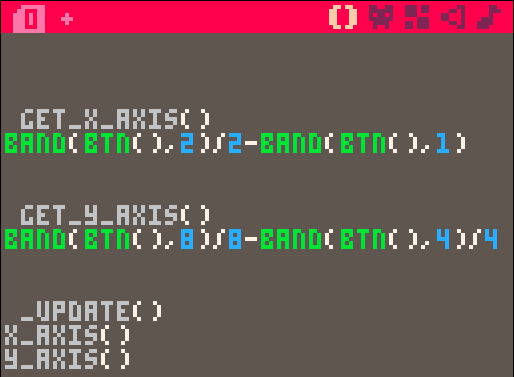
It is possible to respond to each button press in PICO-8 by using conditional statements like this:
if btn(0) then vx=-1 end if btn(1) then vx=1 end if btn(2) then vy=-1 end if btn(3) then vy=1 end
But a more elegant solution is to use the bitwise addition function band(). Calling btn() with no arguments results in a bitfield of outputs. In other words, pressing button 1 (right) gives 000010.
Continuing with the example of pressing the right button, the result is 000010 and so looking at the code in get_x_axis():
band(btn(),2)/2-band(btn(),1)
band(000010,2)/2 returns 1
band(000010,1) returns 0
so 1-0 returns 1, i.e. move to the right (positive).
By checking the bits and subtracting the right from left (or down from up) we end up with a value of -1 or 1 for the movement.
I’ve wrapped the bitwise calculations here into two functions for neatness (get_x_axis and get_y_axis), but this is slightly profligate with tokens and by directly referencing the band() function you can reduce your token count by two from the standard conditional method shown above.
vx=0 vy=0 function get_x_axis() return band(btn(),2)/2-band(btn(),1) end function get_y_axis() return band(btn(),8)/8-band(btn(),4)/4 end function _update() vx=get_x_axis() vy=get_y_axis() end function _draw() cls() print(vx,5,5) print(vy,5,11) end
Feel free to use, and if you spot any further optimizations, let me know!

